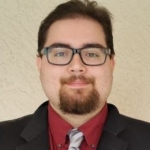Culture and medicine can serve as reflections of each other. As societal changes affect conceptions of health and illness, it is important to explore the expression of health and medicine. In this interview, I speak with Imogen Arate, creator of the podcast Poets and Muses, about how she developed a new venue for these stories.
Tell us a little bit about who you are? What is your profession?
My name is Imogen Arate. I am a poet and the Executive Producer and Host of Poets and Muses, a weekly poetry podcast where I chat with poets about their inspirations.
What is your Poets and Muses focused on?
We are especially interested in featuring diverse emerging poetic voices and exploring the stories behind the poems that our guest poets and I present.
Why did you want to make Poets and Muses?
I began attending a number of open mics in the Valley after moving to Phoenix, and when I encountered poetry that resonated with me, I was curious to know why the poet wrote a particular piece. Unfortunately, as these events often take place in the evenings and those in attendance were often eager to go home at the end of the events, I wasn’t always successful at finding out their back story. So, in part, I began Poets and Muses to satisfy my own curiosity and desire to share these fascinating stories with others.
Given my professional experience in publishing and knowing the underrepresentation of minority and female voices in the industry, I also want to bring the diversity of talented voices to the fore.
Lastly, I hope to inspire people from all walks of life, especially young people, to pick up poetry as another mode of self expression.
How long has Poets and Muses been around for?
I started Poets and Muses with Ms. B (who was our very first poet guest), on a whim, a day before Christmas Eve in 2018 (December 23rd). So, it’s now just a bit over six months old.
What is your hope for what this outlet can do?
To provide a platform for emerging poetic voices from diverse backgrounds and inspire people to overcome their preconceived notions about poetry and who can become a poet and adopt verse as a viable mode of self expression.
How do you think art and medicine can intersect? What is the ultimate goal of this intersection?
I have relied on poetry as a therapeutic tool. Previous to starting Poets and Muses, I also heard about nonprofits utilizing poetry to help veterans cope with PTSD. In my interviews, I’ve heard similar feedback from a number of interviewees. So, I think poetry, and art in general, has the ability to let people express themselves in a way that may not be accessible with everyday communication.
It may also allow people to express repressed memories or emotions via poetic devices, such as metaphors and similes, and scenario building or pictorial representation. I think if a patient is open to sharing these artistic expressions with their healthcare providers, they might serve as good entry points toward discussing physical or psychological issues / ailments or feedback about the medical treatments the patients have been receiving.
From the providers point of view, art can also allow them an outlet for emotions they might need to repress while treating patients in their care (I discussed this aspect with Nicole Nicholson, who is a nurse, in the June 23rd episode of Poets and Muses). It might also help providers to develop their empathic and imaginative skills and in turn, help them to both relate better to those in their care, as well as think outside of the box when encountering difficult-to-diagnose/treat illnesses.
What kind of art do you personally express yourself through?
Aside from writing poetry, I’ve also written short stories, plays and personal essays. I was also working on a novel, which a traumatic experience I lived through prevented me from continuing. I hope to be able to go back to it at some point and finish it. Besides those, I also love singing and dancing, and hope to pick up drawing and/or painting at some point.
What is the most meaningful experience you have dedicated to art?
There are many. I’m currently in East Africa. Because of my quest to interview local poets, I was invited to see a large number of teenage students perform their poems and be the audience(-reaction) judge. The quality of their poetry just blew me away, and I feel incredibly lucky to have taken part in this event. This is especially the case given what I know of the (mis)representation of Africa as a whole to those outside of the continent.
Tell us something cool about yourself!
Is this question for me? If so, it’s really difficult to answer. I don’t know if this is cool or totally geeky, which I think is cool: I’ve written a poem in Shakespearean English.
For interesting articles featuring interviews with poets and their experiences with medicine, please see more at Imogen Arete’s website, https://poetsandmuses.com/ .
Mohammad Khan is a fourth-year medical student in The University of Arizona College of Medicine – Phoenix, Class of 2021. He graduated from Arizona State University in 2014 with two bachelor's degrees in biochemistry and biology. He then worked as a teacher and completed a Master's in biomedical diagnostics in 2017. For fun, Mohammad (who also goes by Mokha) likes to practice at the archery range, work on calligraphy, game, and fountain pen writing, and read science fiction novels. He is interested in medicine with a focus on educating patients.


